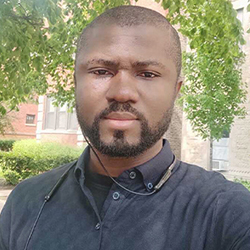PhD Student Tochukwu Eze Inducted to Bouchet Honor Society
Northwestern Engineering’s Tochukwu Dominic Eze has been inducted into the 2025 cohort of the Edward A. Bouchet Graduate Honor Society, which recognizes outstanding scholarly achievement and excellence in doctoral education.
 The Edward A. Bouchet Graduate Honor Society seeks to develop a network of scholars who exemplify academic and personal excellence, foster environments of support, and serve as examples of scholarship, leadership, character, service, and advocacy.
The Edward A. Bouchet Graduate Honor Society seeks to develop a network of scholars who exemplify academic and personal excellence, foster environments of support, and serve as examples of scholarship, leadership, character, service, and advocacy.
Eze, who is pursuing a PhD in computer science, aims to empower students to reach their full potential. He builds intelligent AI systems that can observe how students learn and use that information to provide actionable feedback, facilitate collaborative learning, and produce better academic outcomes.
“By combining machine learning with educational tools, I aim to uncover patterns in how students think, interact, and collaborate,” Eze said. “Ultimately, my goal is to help students improve their learning by offering insights they can use to reflect, adapt, and grow.”
Eze is advised by Marcelo Worsley, Karr Family Associate Professor of Computer Science at the McCormick School of Engineering and associate professor of learning sciences at Northwestern’s School of Education and Social Policy.
Prior to joining Northwestern, Eze served as a lecturer at Nnamdi Azikiwe University in Nigeria. His observations on student learning dynamics inspired his research interests.
“During my tenure, I frequently pondered the reasons behind variations in student performance despite identical learning conditions,” Eze said. “This curiosity led me to delve into learning analytics, aiming to uncover insights into individual and collaborative learning processes facilitated by computers.”
Using an integrated approach, Eze develops machine learning algorithms to power analytic models designed to monitor and predict student progress. The models can identify complex student behaviors, cognitive processes, and interactions, highlighting both individual and group learning patterns.
Eze is working on enhancing a real-time, multimodal learning analytics system called BLINC. The data-capture devices leverage machine learning to analyze students’ cognitive and behavioral patterns and provide feedback that supports the development of collaboration skills. While earlier versions of the system focused primarily on audio data, Eze is expanding BLINC to incorporate video and interaction data for more comprehensive and accurate analysis.
“My project involves designing a multimodal machine learning model that fuses these different data types to assess the quality of collaboration both in real time and after the activity,” Eze said. “In addition, I am developing interactive, student-centered feedback mechanisms that encourage learners to reflect on their progress, engage in meaningful dialogue, and continuously improve their group learning experiences.”
